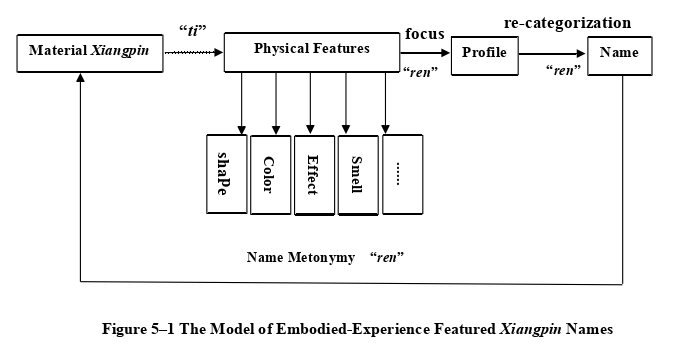联系方式
more本类最新英语论文
- 2024-04-09不确定性的确定性-解读《保..
- 2024-03-31空间视域下内勒小说中黑人女..
- 2024-03-26乔伊斯的《都柏林人》中的经..
- 2024-03-18《哈克贝利·费恩历险记》中..
- 2024-03-16个体心理学理论视角下《掘墓..
- 2024-03-14罗洛·梅焦虑理论视角下《拾..
- 2024-03-11《占有》中知识分子的焦虑探..
- 2024-03-08殖民流散与身份追寻:解读j..
- 2024-03-03规训与反抗:权力与话语视角..
- 2024-02-26虚无与意义的构建:萨特存在..
more热门文章
- 2013-09-29上海英语语言学论文题目:从..
- 2011-12-08英语专业英语语言学论文题目..
- 2010-01-26英语语言学论文选题
- 2010-02-02语言学论文参考选题
- 2010-01-07英语论文题目-语言学论文题..
- 2014-05-26英语论文题目-语言学论文题..
- 2010-01-07英语语言文学专业毕业论文题..
- 2010-01-27英语语言学论文选题
- 2010-03-15英语语言学
- 2010-04-16英语论文选题
more留学论文写作指导
- 2024-03-31卡森•麦卡勒斯小说中..
- 2024-03-28美国黑人女性心理创伤思考—..
- 2024-03-27乔治·艾略特《织工马南》中..
- 2024-03-21超越凝视:论《看不见的人》..
- 2024-03-19《哈克贝利•费恩历险..
- 2024-03-13心灵救赎之旅——从凯利的三..
- 2024-02-22文学地理学视角下的《印度之..
- 2023-05-03英、汉名词短语之形容词修饰..
- 2023-02-07目的论视域下5g—the futur..
- 2022-07-04二语英语和三语日语学习者的..
中国香品名称构建的体系过程探讨 [4]
论文作者:留学生论文论文属性:硕士毕业论文 dissertation登出时间:2023-01-31编辑:vicky点击率:650
论文字数:35633论文编号:org202301251050579890语种:英语 English地区:中国价格:$ 44
关键词:英语语言学论文题目
摘要:本文是一篇英语语言学论文题目,本文主要以体现认知观、事件域认知模型和命名转喻理论为基础,构建了中国香品名的体现认知模型。
5.2 Operation of Xiangpin Embodiment-Cognition Model .................. 31
Chapter Six Unified Interpretation for Different Xiangpin Names by the Embodiment-Cognition Model
6.1 Embodied-Experience Featured Xiangpin Names
Ungerer& Schmid (1996:278) pointed out that the meanings expressed by words in language and how to combine them depend on people’s perception and categorization of the real world around them. That is, embodied experience. Since people are constantly observing and experiencing the world and playing an active role in it, they are well aware of the composition of world entities. And this perception and experience are reflected in the essence of language. In addition, Wang Yin (2007) believes that the differences in grammatical expression forms are caused by the different ways of people’s cognition of real events. Therefore, the vocabulary in the Chinese Xiangpin name depends on people’s construal. According to embodied cognition model in China, the first situation that people understands subjectively is to select the focus on the part of the direct “experience interaction” between Xiangpin and body senses, including the experience characteristics of smell, taste, vision, and using the corresponding effective vocabulary as the biggest highlight. After summarizing, the name of Xiangpin is determined. The specific operation is now shown as follows in Figure 5-1):

Chapter Seven Conclusion
7.1 Major Finding
The embodied cognition research on word naming mainly focuses on the “naming metonymy view” proposed by Wang Yin in 2009. While the view has made important contributions to the origin and formation of names, it also has some limitations in interpretation, namely: relevant research mainly focuses on the conclusion part of naming metonymy, and relatively neglects to explain the dynamic process of naming metonymy in detail. Moreover, the names of Chinese Xiangpin, as the special language symbols of Han Nationality, must not be analyzed on the surface of the characters, and the in-depth research must be inseparable from the dynamic embodiment cognition process of human subjects. Therefore, this paper combines the achievements of predecessors, reflects on its shortcomings, and tries to construct an embodied cognition model to analyze the names of Chinese Xiangpin, so as to further explain the motivation and laws of the names (especially the naming of Xiangpin) reasonably, and draw the following conclusions:
Firstly, Chinese Xiangpin name has the nature of “body(ti)”, which manifests that it is deeply rooted in the daily life and perceptual experience of the Chinese people. In the interactive experience of the namer with the material Xiangpin, the conceptual subject of conceptualization perceives some external physical attributes of the material fragrance (such as the shape, color, efficacy, taste, etc.) of the material Xiangpin through perception systems such as vision, taste, and smell.
Secondly, Chinese Xiangpin names have the nature of “mind(ren)” because the language itself is humanistic, which is reflected in people’s re-cognition of the material Xiangpin in the objective world. In this article, construal is the main way. And based on the interactive experience, the subject of conceptualizati本论文由英语论文网提供整理,提供论文代写,英语论文代写,代写论文,代写英语论文,代写留学生论文,代写英文论文,留学生论文代写相关核心关键词搜索。

 英国
英国 澳大利亚
澳大利亚 美国
美国 加拿大
加拿大 新西兰
新西兰 新加坡
新加坡 香港
香港 日本
日本 韩国
韩国 法国
法国 德国
德国 爱尔兰
爱尔兰 瑞士
瑞士 荷兰
荷兰 俄罗斯
俄罗斯 西班牙
西班牙 马来西亚
马来西亚 南非
南非






